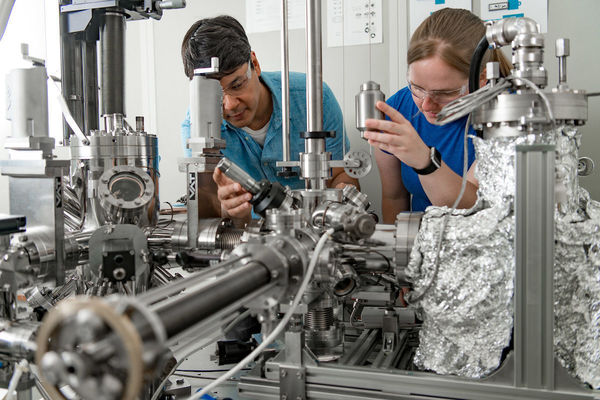
The University of Notre Dame continued the steady expansion and growth of its research, scholarship, and creative endeavor programs during the most recent fiscal year (FY), recording $141.6 million in research funding. This surpasses the $138.1 million received in FY 2017. The amount is part of a trend that has led to a 75 percent increase in external research funding awarded to Notre Dame compared to 10 years ago.
“Despite a very competitive environment and some delays in federal grant awards that are still playing out, our faculty members successfully sustained and expanded their research programs through innovative ideas, collaborations, and partnerships for research that addresses significant technological and societal challenges,” said Robert J. Bernhard, vice president for research and professor of aerospace and mechanical engineering. “I congratulate our hardworking researchers and administrative staff for their success in helping Notre Dame continue to advance our research programs as a force for good.”
Among the significant new research programs that were launched this year is the Applications and Systems-driven Center for Energy Efficient integrated Nano Technologies (ASCENT). Led by Notre Dame’s Suman Datta, Frank M. Freimann Professor of Engineering, the multi-university research collaboration, which includes Cornell University, Georgia Institute of Technology, Purdue University, Stanford University, University of Minnesota, University of California-Berkeley, University of California-Los Angeles, University of California-Santa Barbara, University of California-San Diego, University of Colorado, University of Texas-Dallas, and Wayne State University, is tasked with developing next-generation technologies that increase the performance, efficiency, and capabilities of future computing systems for both commercial and defense applications.
This center, which developed out of the University’s Center for Nano Science and Technology (NDnano), the Notre Dame-led Center for Low Energy Systems Technology (LEAST), and the Midwest Institute for Nanoelectronics Discovery (MIND), is funded by the Semiconductor Research Corporation’s (SRC’s) Joint University Microelectronics Program (JUMP), which represents a consortium of major semiconductor and defense companies, the Defense Advanced Research Projects Agency (DARPA), and the Indiana Economic Development Corporation (IEDC).
Additionally, Peter Burns, Henry Massman Professor of Civil & Environmental Engineering & Earth Sciences and director of Notre Dame’s Center for Sustainable Energy (ND Energy), is leading a newly awarded National Nuclear Security Administration (NNSA) Actinide Center of Excellence (ACE). This center includes a partnership with multiple universities and aims to prioritize research that is important for stockpile stewardship – the certification that the nation’s nuclear weapons are secure and operational. Collaborating universities include Northwestern University, Oregon State University, the University of Minnesota, and Washington State University. Similar to ASCENT, ACE has a history of success, as Burns previously led an Energy Frontier Research Center (EFRC) at Notre Dame with funding from the Department of Energy.
Notre Dame is also leading a new National Institutes of Health (NIH) program project (P01) grant. The grant’s principal investigator, Michael Ferdig, professor of biological sciences and affiliated faculty of the Eck Institute for Global Health, is partnering with the Center for Infectious Disease Research in Seattle, Washington and the Texas Biomedical Research Institute on the project. The goal of the program is to better understand the genes in the malaria parasite that are responsible for drug resistance and virulence in order to reduce and ultimately eliminate the deadly disease.
Overall for FY18, 62.9 percent of Notre Dame’s external research awards came from federal funding while 24.2 percent was the result of foundation and other sponsor funding, and 12.9 percent came from industry awards. The University also expanded its global footprint to operating research grants in 32 countries.
To learn more about the research, scholarship, and creative endeavor at the University of Notre Dame, please visit research.nd.edu.
Contact:
Brandi R. Klingerman / Research Communications Specialist
Notre Dame Research / University of Notre Dame
bklinger@nd.edu / 574.631.8183
research.nd.edu / @UNDResearch
About Notre Dame Research:
The University of Notre Dame is a private research and teaching university inspired by its Catholic mission. Located in South Bend, Indiana, its researchers are advancing human understanding through research, scholarship, education, and creative endeavor in order to be a repository for knowledge and a powerful means for doing good in the world. For more information, please see research.nd.edu or @UNDResearch.
Originally published by at research.nd.edu on August 08, 2018.